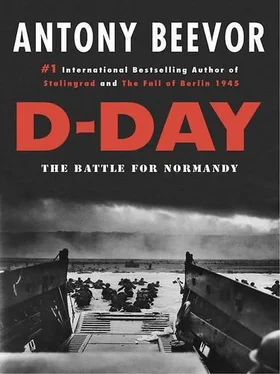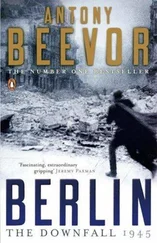Churchill sent two York passenger aircraft to Algiers to bring back de Gaulle and his retinue. But de Gaulle was reluctant to come, because Roosevelt would not permit a discussion on French civil government. Churchill’s representative, Duff Cooper, argued with him for an hour on 2 June, trying to persuade him to back off from this brinkmanship. If de Gaulle refused to come, then he would be playing into Roosevelt’s hands, Duff Cooper told him. He should be present in England in his role as military leader. Above all, Duff Cooper warned him, he would finally lose the regard of the Prime Minister, who would decide that he was an impossible man to deal with. De Gaulle agreed only the next morning, when the two Yorks were already waiting for them on the airfield to take them on the first leg of the journey to Rabat in French Morocco.
After flying through the night from Rabat, de Gaulle’s plane touched down at exactly 06.00 hours on 4 June at Northolt. After all the secrecy imposed on their journey, Duff Cooper was surprised to find a large guard of honour drawn up and an RAF band playing the ‘Marseillaise’ as they descended the steps. A very Churchillian letter of greeting was handed to de Gaulle. ‘My dear General de Gaulle,’ it read. ‘Welcome to these shores! Very great military events are about to take place.’ He invited him down to join him on his personal train. ‘If you could be here by 1.30 p.m., I should be glad to give you dejeuner and we will then repair to General Eisenhower’s headquarters.’
Duff Cooper was mystified by the notion of Churchill’s ‘advance headquarters’ on a train, which they finally found in a siding at a small station near Portsmouth. He considered it ‘a perfectly absurd scheme’. His heart sank much further when he found that Field Marshal Smuts, the decidedly Francophobe South African, was in the Prime Minister’s entourage. Then Churchill opened the conversation with de Gaulle by saying that he had brought him over to deliver a speech on the radio. To make matters even worse, he made no mention of discussing civil affairs in France, the subject of greatest interest to de Gaulle.
When Anthony Eden, the Foreign Secretary, turned the conversation to ‘politics’, which basically meant Roosevelt’s continued refusal to recognize de Gaulle and his provisional government, de Gaulle’s anger erupted. His resentment was inflamed by the Allied currency printed in the United States and issued to their troops. He said that this currency, which he considered ‘ une fausse monnaie ’, was ‘absolutely unrecognized by the government of the Republic’. This was an important point which does not appear to have occurred either to the American authorities or to the British. If no government was prepared to back these rather unimpressively printed banknotes — American troops compared them to ‘cigar coupons’ — then they were worthless.
Churchill flared up, demanding how the British could act separately from the United States. ‘We are going to liberate Europe, but it is because the Americans are with us. So get this quite clear. Every time we have to decide between Europe and the open sea, it is always the open sea that we shall choose. Every time I have to decide between you and Roosevelt, I shall always choose Roosevelt.’ De Gaulle coolly accepted that that was bound to be the case. Tempers calmed as they sat down to lunch. Churchill raised his glass: ‘To de Gaulle, who never accepted defeat.’ De Gaulle raised his in reply: ‘To Britain, to victory, to Europe.’
Afterwards, Churchill accompanied de Gaulle over to Southwick House. There, Eisenhower and Bedell Smith briefed the French leader on the plan for Overlord. Eisenhower was charming and concealed the turmoil he was going through as a result of the weather. Before de Gaulle left, however, Eisenhower showed him a copy of the proclamation he was to make to the French people on D-Day. Although he had softened Roosevelt’s peremptory tone, the speech did not recognize the authority of the provisional government in any way. In fact, it even instructed the French to obey the orders of the Allied command until ‘the French themselves should choose their representatives and their government’. For de Gaulle this confirmed his worst fear of an Anglo-Saxon occupation of France. He kept his temper, however, and simply said that he ‘wished to suggest certain changes in General Eisenhower’s message’. Eisenhower agreed to consider them, since there might be time to make alterations.
On his return to London, de Gaulle heard that his suggested amendments could not be approved in time, as the Joint Chiefs of Staff would need to agree them. De Gaulle then refused to speak to the French people on the BBC the next morning after Eisenhower and the leaders of other occupied countries. De Gaulle also announced that he was ordering the French liaison officers allocated to British and American divisions not to accompany them because no agreement had been reached on civil administration. When Churchill received the news during a meeting of the War Cabinet he exploded in a terrible rage.
That night, Eden and de Gaulle’s emissary, Pierre Viénot, engaged in shuttle diplomacy between the two furious leaders to repair the damage. De Gaulle raged at Viénot, saying that Churchill was a ‘gangster’. Viénot then went to see Churchill, who accused de Gaulle of ‘treason at the height of battle’. He wanted to fly him back to Algiers, ‘in chains if necessary’.
Even with all these dramas, the most important event on that evening of Sunday, 4 June, took place in the library at Southwick House. During the afternoon, Stagg and his colleagues had seen that the approaching depression in the Atlantic had concentrated, but also slowed down. This indicated that a sufficient gap in the bad weather was emerging for the invasion to go ahead. At 21.30 hours the conference began and Stagg was summoned. Few of those present felt optimistic. Rain and wind were battering the windows, and they could imagine what conditions were like for the tens of thousands of soldiers on the landing ships and craft anchored along the coasts.
‘Gentlemen,’ said Stagg, ‘since I presented the forecast last evening some rapid and unexpected developments have occurred over the north Atlantic.’ There would be a brief improvement from Monday afternoon. The weather would not be ideal, was the gist of his message, but it would do. Searching questions followed and an earnest discussion began.
‘Let’s be clear about one thing,’ Admiral Ramsay broke in. ‘If Overlord is to proceed on Tuesday I must issue provisional warning to my forces within the next half-hour. But if they do restart and have to be recalled again, there can be no question of continuing on Wednesday.’
Leigh-Mallory again expressed concern about sufficient visibility for his bombers, but Eisenhower turned to Montgomery, who was wearing his unconventional uniform of a fawn pullover and baggy corduroys.
‘Do you see any reason why we should not go on Tuesday?’
‘No,’ replied Montgomery emphatically in his nasal voice. ‘I would say — Go .’
Outside in the hall, staff officers were waiting with sheaves of orders ready to be signed by their chiefs. Two sets had been prepared to cover both alternatives.
In the early hours of Monday, 5 June, further data came in to confirm the break in the weather. At the morning conference, Stagg was able to face his intimidating audience with much greater confidence. The tension eased and ‘the Supreme Commander and his colleagues became as new men’, he wrote afterwards. Eisenhower’s grin returned. Further details were discussed, but everyone was impatient to leave and the room emptied rapidly. There was much to be done to get the 5,000 ships from nearly a dozen different nations back to sea and on course down pre-established shipping lanes. A small fleet of minesweepers in line abreast would then proceed in front of them to clear a broad channel all the way to the beaches. Admiral Ramsay was particularly concerned for the crews of these vulnerable craft. They expected very heavy casualties.
Читать дальше











